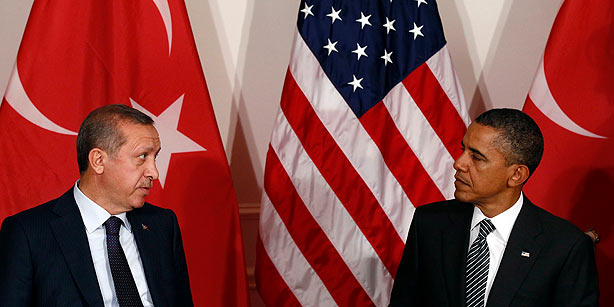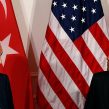
Turkish Prime Minister Erdogan’s Visit to Washington and Its Impact on Syrian Crisis
Publication: Eurasia Daily Monitor Volume: 10 Issue: 101
By:

On May 16, Turkish Prime Minister Recep Tayyip Erdogan visited Washington with four issues on his agenda: the crisis in Syria; the future of Turkish-Israeli relations; Turkish-Iraqi relations, in which the Kurdish question and energy issues were the top priority; and a Transatlantic Trade and Investment Partnership (TTIP) between the United States and Turkey. The Syria crisis apparently overshadowed the other three issues, however.
Erdogan’s priority was to pressure the Barack Obama administration into more openly supporting the Syrian opposition. The pressing nature of the situation in Syria was again illustrated just a few days before the Turkish prime minister’s US trip. On May 11, two car bombs exploded in Reyhanli, a Turkish city on the border with Syria, killing more than 50 people—most of whom were Turkish citizens (Sabah, May 11). Turkish authorities soon revealed that the attack appeared to be linked to the Syrian intelligence agency, the Mukhabarat (Hurriyet Daily News, May 28).
Erdogan went to Washington with high expectations that he would convince the Obama administration to hasten the removal of Syrian President Bashir al-Assad from power. Before taking off from the Ankara airport, Erdogan said, “We will determine a new roadmap toward the Syrian crisis.” In response to a journalist, he added, “We will talk about how to take assertive policies toward removing the Assad regime. The first Geneva initiative [the so-called ‘Kofi Annan Plan’ of April 2012, aimed at securing a cease-fire and opening negotiations between the Syrian government and opposition] did not produce any result. To me, the second Geneva initiative [a proposed round table negotiation between the Assad regime and the opposition, championed by Russia and cautiously endorsed by Secretary of State John Kerry in his visit to Moscow—see EDM, May 16) seems to be about finding excuses to not become involved in the Syrian crisis” (Iha, May 14)
Nevertheless, after returning from the US, Erdogan appeared to change his policy toward Syria. Back in Turkey he noted, “Before I came to Washington, I called the Geneva initiative an inefficient effort to solve the problem, but I changed my mind. In order to bring Russia and China into the process, [Turkey] will support the second Geneva initiative. But the initiative should not be an opportunity for the Assad regime to gain more time” (Milliyet, May 19)
The Turkish head of government further claimed that he had convinced officials in Washington to provide more “logistic” support to the opposition (Yenisafak, May 23). “We think that [if] countries like the US [provide] logistic support to the opposition it will empower them. We saw signals that the US would provide logistic supports to the opposition,” he said, without detailing what specific form this support would take (Haberturk, May 21). Yet, it should be noted that when Turkish authorities use the term “logistic” support, they usually mean to say “weapons” or technological support that would help improve the fighting capabilities of the opposition.
The Turkish press outlined Turkey’s new roadmap toward Syria as follows (Haberturk, May 23):
• Turkey will support the Geneva initiative to give diplomatic efforts one final chance.
• Turkey will increase its support to the opposition.
• Pressure on Bashar al-Assad will be increased, and sanctions on Damascus will be tightened.
• Turkey will not support an open-ended negotiation process.
• If the parties agree on a transition period, a ceasefire agreement will be signed and the ceasefire period will be monitored by international organizations.
• Turkey will seek a timetable to delineate the transition period toward a new government.
• Assad supporters who were involved in killings will not have any position in the transition government.
• Assad will have no power.
• Human rights violations will be documented.
• The political prisoners who were arrested during the period of conflict will be set free, and victims and their families should be provided with compensation.
• Syrian refugees will return to Syria.
While the Erdogan government has tried to define a new roadmap toward Syria, Turkey’s opposition parties have harshly criticized the government, greatly raising domestic political tensions. Recently, Kemal Kilicdaroglu, the leader of the main opposition faction, the Republican Peoples’ Party (CHP), delivered a speech in Brussels and equated Erdogan with Syrian President Assad. In response, Erdogan sued him for 1 million Turkish lira ($540,000) (Hurriyet Daily News, May 24)
Despite the atmosphere of uncertainty in Ankara, some political observers assess that Turkey is crucial to the Obama administration as it seeks to develop a workable Syria policy. They argue that over the long term, Turkey’s diplomacy with the US will lead to a truly close bilateral dialogue and consultation mechanism, which will allow the two countries to rely on each other and receive assistance in the policy realm (Hurriyet Daily News, May 22). However, other Turkish experts disagree, maintaining that the Geneva initiative, which Erdogan embraced following his trip to Washington, will be seen as a Russian diplomatic success and an opportunity for the Assad regime to extend its durability. Moreover, these critics contend, Erdogan should see that his US visit did not produce a tangible result related to the Syria crisis. The longer the Assad regime remains in power, therefore, the greater a threat it becomes for Turkey and the Erdogan government (Radikal, May 19).
In fact, even Erdogan himself realized the important role of Moscow in resolving the Syrian crisis and decided to visit Russia soon (NTV, May 17). However, it is unknown how soon such a trip may take place. So far, Erdogan’s next scheduled visit to Russia will be to take part in the G20 summit, which will be hosted in St. Petersburg on September 5–6 (Anadolu Ajansi, May 23).
Taken all together, this means that, despite Ankara’s expectations to remove the Assad regime soon, Turkey will likely have to face the consequences of the crisis in Syria for months, if not years, to come. Meanwhile, 2014 will be crucial for Turkey’s government due to the upcoming local and presidential elections scheduled for that year. But the continued deterioration of the Syrian crisis may deeply affect the Erdogan government’s popularity in the coming electoral contests.




